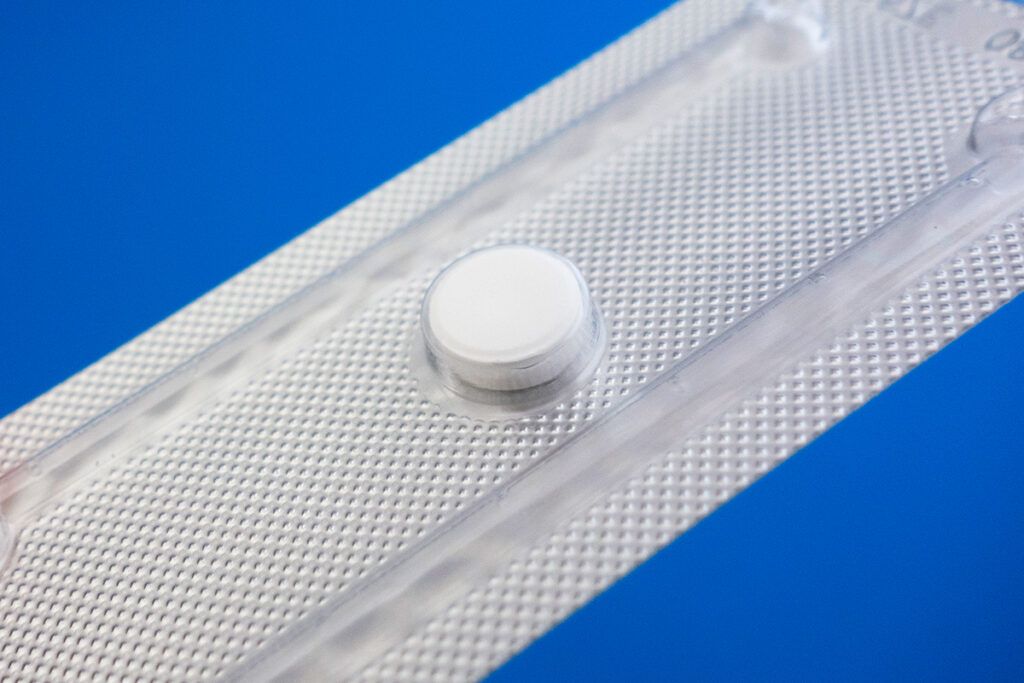Plan B One-Step is a brand name for emergency contraception. It’s often called the morning-after pill, and you can buy it over the counter (OTC) without a prescription. It contains 1.5 milligrams (mg) of levonorgestrel.
Taking Plan B within 72 hours after having sexual intercourse lowers the chance of unintended pregnancy if you:
- aren’t using any form of birth control
- are using birth control but it didn’t work, like if a condom broke
- missed a birth control pill or incorrectly used other forms of birth control
How long does Plan B stay in your body?

The average half-life of Plan B is 27.5 hours. This is how long it takes your body to use and reduce the total dose of the drug by half. This half-life may be the most potent and effective time period for the drug.
The average person may remove Plan B from their system after around five half-lives, which is just under 6 days.
Keep in mind that the half-life of a medication may vary from person to person, and Plan B could stay in the body for slightly longer or shorter than these 6 days.
Even if some of the Plan B dose stays in your system for 6 days, this doesn’t mean it’s effective at preventing a pregnancy for that time.
For example, if you took a Plan B pill 4 days before having sex without birth control, it may no longer prevent pregnancy.
When should you take Plan B?
The sooner you take Plan B after having sex without birth control, the better it works.
You should take Plan B no later than 72 hours, or 3 days, after having sex without a barrier method or another birth control method. If you take Plan B within this time frame, your chance of getting pregnant is reduced by around 84%.
If more than 72 hours have passed, you may need other emergency contraception options, including other types of pills and intrauterine contraceptive devices (IUDs).
You should discuss these options with a healthcare professional.
How does Plan B work?
Levonorgestrel, the active ingredient in Plan B One-Step, is a synthetic progestin hormone. Progestin mimics your body’s natural progesterone hormone — which affects health aspects like your menstrual cycle and pregnancy.
The 1.5 mg of levonorgestrel in Plan B prevents the ovaries from releasing an egg. It also thickens your cervical mucus, making it more difficult for sperm to reach the egg.
This makes it less likely that a pregnancy will occur, though it doesn’t work 100% of the time.
Plan B isn’t an abortion pill and won’t terminate an existing pregnancy. It also doesn’t protect against sexually transmitted infections (STIs).
How often can you use Plan B?
While Plan B is a safe and effective option for emergency contraception, you shouldn’t rely on it as a regular method of birth control. It’s not as effective as options like the pill, condoms, or IUDs.
Also, regularly using emergency contraception can make your menstrual periods irregular and increase the chance of side effects, including hormone-related disorders.
Side effects and risks of Plan B
Like any medication, Plan B may lead to side effects, including:
- nausea
- stomach pain
- fatigue (low energy)
- tender breasts
- spotting and changes in menstrual bleeding
- headaches
- dizziness
Plan B and other progestin medications may also increase the chance of ectopic pregnancies. This is when a fertilized egg implants and grows outside the uterus. It can lead to health complications.
If you experience stomach pain, nausea, lightheadedness, or unusual vaginal bleeding for 3–5 weeks after taking Plan B, it’s important to get immediate medical care.
Another thing to consider is that Plan B isn’t always effective, even if you take it within the recommended time frame. If your period is late after taking Plan B, consider taking a pregnancy test.
While Plan B is safe for most people, it’s best to talk with a healthcare professional before taking it if you are:
- taking medications or herbal products that include enzymes that metabolize progestins, such as topiramate, St. John’s wort, and phenytoin
- taking medications for HIV
- thinking you might be pregnant
- nursing
Plan B doesn’t protect against STIs, which don’t always cause symptoms. You should ask a healthcare professional about testing if you’ve had sex without any barrier methods, like a condom.
Plan B alternatives
Other brand names for levonorgestrel emergency contraception include:
- Fallback Solo
- Next Choice One Dose
- Opcicon One-Step
- AfterPill
- EContra One-Step
Another emergency pill option is ulipristal acetate (Ella). It may be more effective than Plan B at preventing pregnancy after 3–5 days. But it’s not available OTC, so you need a prescription from a healthcare professional to get it.
Besides pills, a copper IUD can also work as emergency contraception. Getting one within 5 days after sex without birth control may reduce the chance of pregnancy by 99.9%. Plus, the IUD provides ongoing protection, so you won’t need to use Plan B later.
Nonemergency hormonal birth control methods include:
- Progestin-only pills (mini-pills): You take one pill every day. Options include norethindrone (Camila).
- Birth control injection: You use it as an injection every 3 months. Options include medroxyprogesterone acetate (Depo-Provera).
- Birth control ring: You insert it into the vagina. Options include etonogestrel ethinyl estradiol (NuvaRing).
- Birth control patch: The patch goes on your skin and it releases hormones into the bloodstream. Options include ethinyl estradiol norelgestromin (Xulane).
- Implant: A tiny rod is inserted under your skin. Options include etonogestrel (Nexplanon).
If you need help covering the cost of medications, the free Optum Perks Discount Card could help you save up to 80% on prescription drugs. Follow the links on drug names for savings on that medication, or search for a specific drug here.
